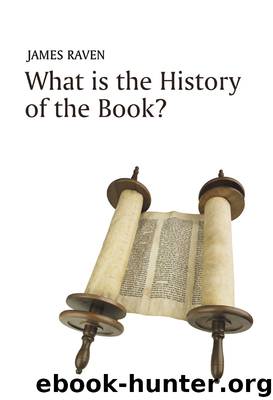What is the History of the Book? by James Raven

Author:James Raven
Language: eng
Format: epub
Publisher: Wiley
Published: 2018-01-06T05:00:00+00:00
4
Who, What and How?
Questioning of the who, what and how underpins the astonishing development of the history of the book in the last thirty years. Crucially, however, these questions have been posed in relation to one another, ensuring that the agents and agencies determining and controlling production and transmission were not analysed in isolation. Judicious questioners, often resisting pigeonholing as ‘historians of the book’, ensured that the focus of study was not divorced from the historical circumstances of production, circulation and use, whether that focus was the identification of authorship, editorial annotation and the recovery of authorial intent, censorship and copyright evasion, or the cataloguing procedures of an ancient library.
Few of those recovering a printer's copy-text or establishing a copy-text for an ‘ideal’ edition for literary evaluation ignored new possibilities for understanding the historical context of the manufacture and reproduction of the text. D. F McKenzie and Jerome J. McGann were among the most influential of those who, in different ways, re-examined evidence relating to the physical text, from its composition, typographical presentation and material form, to the social, economic and political circumstances of its publication. McKenzie, for example, in establishing the first full critical edition of the works of William Congreve, in the absence of surviving manuscripts for any of the key texts, reimagined the playwright's intentions by a rigorous and close analysis of early printings coupled with a vast range of historical sources. The bibliographical revisionism they inspired focused on the recovery of scribal and printers’ working practices and of the meaning of texts within the particularities of their publication, transmission and reception. McKenzie's later work built upon his earlier pioneering research, which recovered evidence of the payments to compositors and pressmen and established that concurrent printing, that is the use of more than printing press and even printing house to complete an edition, was a common early modern practice. Such research not only reinforced the importance of archival evidence as a necessary adjunct to an examination of the material book, but advanced the argument that every text contained interventions that could not and should not be suppressed by modern editorial processes.
Fresh insights offered a means of conceptualizing change over time: of materials, of the different personnel, of different techniques, of transport and of acquisition and response. The pursuit of a more historical agenda, of agency and causation, inevitably urged new questioning of the economics of production, supply and investment, including, notably, the protection of literary property by copyright and other controls such as guild supervision. How, for example, were expansion and contraction related to patronage, market or distributive conditions and to the intervention of external checks in the form of pre- and post-publication censorship, licensing and political and judicial sanctions against literary content?
By the final decade of the twentieth century, diverse scholars, pursuing different interests, and many free of the constraints of university departments, addressed what were now increasingly labelled ‘book history’ questions in relation to authors, scribes, printers and financing publishers and to many different types
Download
This site does not store any files on its server. We only index and link to content provided by other sites. Please contact the content providers to delete copyright contents if any and email us, we'll remove relevant links or contents immediately.
Asking the Right Questions: A Guide to Critical Thinking by M. Neil Browne & Stuart M. Keeley(5757)
Autoboyography by Christina Lauren(5227)
Eat That Frog! by Brian Tracy(4525)
Dialogue by Robert McKee(4388)
Sticky Fingers by Joe Hagan(4188)
Journeys Out of the Body by Robert Monroe(3615)
Annapurna by Maurice Herzog(3464)
Full Circle by Michael Palin(3443)
Schaum's Quick Guide to Writing Great Short Stories by Margaret Lucke(3373)
Elements of Style 2017 by Richard De A'Morelli(3339)
The Art of Dramatic Writing: Its Basis in the Creative Interpretation of Human Motives by Egri Lajos(3058)
Atlas Obscura by Joshua Foer(2952)
Why I Write by George Orwell(2944)
The Diviners by Libba Bray(2927)
The Fight by Norman Mailer(2927)
In Patagonia by Bruce Chatwin(2920)
The Mental Game of Writing: How to Overcome Obstacles, Stay Creative and Productive, and Free Your Mind for Success by James Scott Bell(2897)
Venice by Jan Morris(2568)
The Elements of Style by William Strunk and E. B. White(2470)
